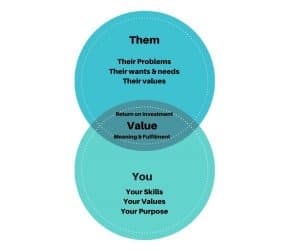Why Applying For A Job Just Because You Can Do It, Is Not A Good Idea
I had my first session with a new client last week, and she was depleted. She shared with me that she didn’t know what she wanted to do in her career, had been drifting from job to job, and was now in her late 40’s/early 50’s and still didn’t know which way to go. She’d accumulated a range of skills, and was therefore applying to a wide range of roles, but was just getting rejection after rejection. As you can imagine, all of this rejection had taken its toll on her self confidence and self worth.
I would often see this during my recruitment career. People would phone up in response to a job ad I’d placed and say “I can do this so I’m thinking of applying.” Then, when we had a chat about their background, it was obvious that they had some transferable skills, but there were going to be a large number of applicants who would be a stronger fit. Don’t get me wrong, I would much rather see people be enthusiastic, keen and ambitious, however it’s important to channel that energy in the direction that is going to have the better return on investment for them. Having coached people on how to tailor their resume and cover letter and position themselves for roles, I know how much work goes into (or should go into) each application, so I want it to be worthwhile for people.
This is a case of quality, not quantity. I’ve heard other career coaches say ‘You need to apply to at least 20 jobs a week’, but I don’t subscribe to statistics. Apply for a job if there is a strong alignment and if you feel you have a strong value proposition to the employer. Put more time and effort into fewer applications and invest that extra time in other job search strategies (like directly targeting organisations you’d like to work for, or updating people in your network as to what you’re looking for). If you keep applying for roles simply because you have some skills that fit the job, or have done something similar, make sure you taper your expectations. It’s a fine line I know between ‘going for it’ and effectively targeting your applications.
If you can’t answer this one question with a strong answer, then perhaps you shouldn’t apply:
“What is your value proposition to that employer?”

If you haven’t got a compelling answer to this question, then I would check your thinking with a friend or career coach or recruiter to see if it makes sense to apply.
Sorry for the tough love, but it comes with the intention of helping you stay motivated during your job search. It’s hard enough for candidates to maintain their enthusiasm through the job search jungle, without being bombarded with constant rejection, or worse still, no acknowledgement or feedback. I’m not saying that you need to be able to do everything in the ad or position description, but ideally around 70-80% of it to be a competitive candidate. The more you can see that your action is getting positive results (whether that’s a screening call or an interview), the more you will be encouraged during your search, and maintain a balanced emotional perspective, and this has many positive flow on effects in regards to what you attract, and how you perform at interview, and how successful you are at securing a job you love.
If you want some clarity around what jobs you should be applying for, or how to tailor your resume or cover letter effectively for each relevant job, I have developed several programs that share my 27 years experience as a recruiter, and 5 years as a career coach here.



